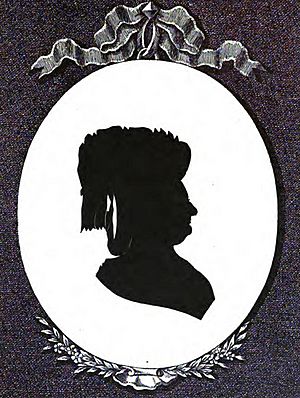Maria Zubova facts for kids
Maria Voinovna Zubova (Russian: Мария Воиновна Зубова), who lived from about 1749 to 1799, was a talented Russian poet, composer, and concert singer. She was especially known for singing folk songs.
Maria was born in Saint Petersburg. Her father was Vice-Admiral Warrior Yakovlevich Rimsky-Korsakov. She married Afanasy Nikolaevich Zubov (1738-1822). He was the Governor of Kursk from 1782 to 1791. In 1780, Maria and her husband moved to an estate near Murom, Vladimir Oblast. Murom is one of Russia's oldest cities.
Contents
A Talented Composer
Maria Zubova wrote beautiful poems and songs for people to enjoy at home in the late 1700s. The Russian writer Daniil Mordovtsev called her one of the "literary daughters" of famous writers like Mikhail Lomonosov and Alexander Sumarokov.
Most of her music was not published. Only a small part of her work was printed in Saint Petersburg around 1770. She also translated French books, but these translations were never published.
Her Most Famous Song
Maria is most famous for her folk song "I am moving to the desert..." from 1791. The words from this song are still used in Russian today. For example, people might say, "From the beautiful places here," to jokingly show they are happy to leave a bad place. It's like saying the "heat of the desert" is better than where they are now.
The exact date of this song is debated. Many of her songs were printed 10 years earlier in a collection by M. D Chulkov and N. I Novikov. The song appears in several collections. The most recent is a Soviet collection from 1979 called "Monuments of Russian Musical Art." This collection was put together by Yuri V. Keldysh. He presented the song in a simple classical style, without extra decorations or bass music.
Themes in Her Music
Zubova's songs used her own poems. Her music was influenced by Russia's growth and new ideas during the time of Peter the Great and Catherine the Great. Because she was active in the late 1700s, her songs and romances often talked about everyday life. They showed the real experiences of ordinary people. This made her very popular across all parts of Russian society.
Mordovtsev noted that Zubova's songs were among the first that Russians could truly sing with emotion. This was after a difficult time in Russia called the Raskol movement. This was a religious split in the 1600s. It caused problems and led to people called "Old Believers" being treated badly.
“These were the first songs which Russia allowed itself to sing along with the songs of Sumarokov and his daughters after the Schism: poems, spiritual cantatas ... and folk songs of a ritual or everyday cycle”
A Talented Performer
Besides writing music, Maria Zubova was also a very skilled folk-song performer. She often sang at parties and social gatherings, and people loved her performances. The Russian folklorist Mikhail Nikolaevich Makarov (1785-1847) called her "the best singer" during the early years of Catherine the Great's rule.
Maria's singing style was influenced by Italian music. In the 1700s, it was common for singers to add their own decorations and changes to melodies while performing. This style was called "figured singing." Maria was known for her skillful movements and strong emotions while singing, but she always kept a calm and graceful presence.
Her Personality and Death
Natalia Kirillovna Zagryazhskaya (1747-1837) was a lady-in-waiting to Catherine the Great. She was also a close friend of Alexander Pushkin. Natalia described Zubova as "an intelligent and amiable woman."
On October 9, 1799, Count Fyodor Rostopchin and Count Semyon Vorontsov told Zubova's family that she had died suddenly. She had a stroke while playing cards with friends.
Her Compositions
Songs
- 1791: I am moving away from the beautiful local places into the desert, for piano and voice
Anthologies (Collections of Songs)
- 1770: Collection of Various Songs (Second version, 1788), by M. D Chulkov and N. I Novikov
- 1827: Newest Selected Songbook
- 1979: Monuments of Russian musical art. Issue 1: Russian vocal lyrics of the 18th century, collected by Yuri. V. Keldysh
Poems
- Amanda Ewington, a writer, noted that Maria Zubova's poem "I am Leaving for the Wilds" was once very popular in Russia. It was loved by people from all social classes.
Recordings of Her Music
- I am banished to the Desert: Performed by Ensemble Talisman, with Oleg Timofeyev (Guitar) and Anne Harley (Soprano). This recording is on the album Music of Russian Princesses (2013) by Dorian Recordings.
- I am retiring to the Desert: Performed by M. Zhilkin (soprano), E. Mityushkina (mezzo-soprano), and I. Malyshev (piano).
 | Shirley Ann Jackson |
 | Garett Morgan |
 | J. Ernest Wilkins Jr. |
 | Elijah McCoy |


